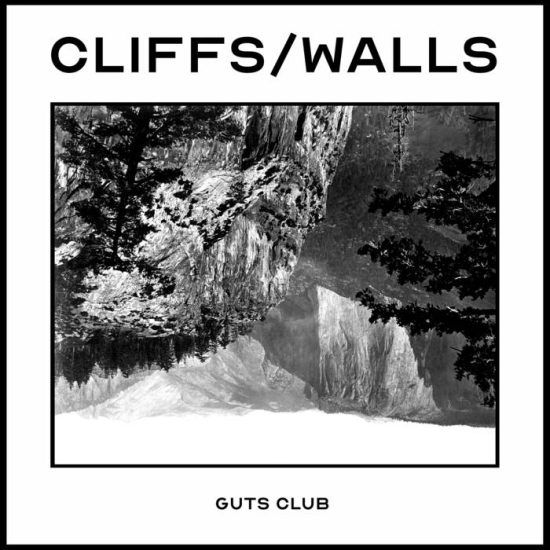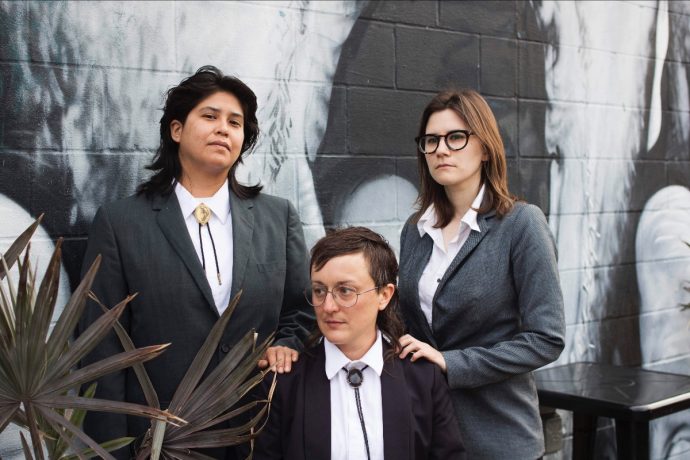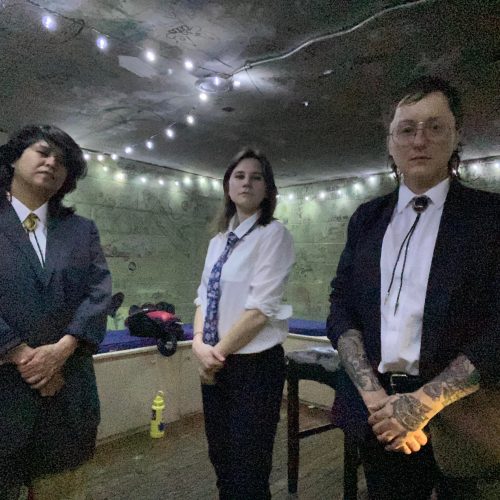
It’s tempting to call NOLA’s Guts Club a musical chameleon, because their music has changed over time in such startling ways. But the analogy falls apart. Unlike those highly adaptable Old World lizards, Guts Club haven’t changed to blend in, but have changed to stand out. Maybe their latest change was itself a mechanism for their own emotional survival in especially harrying times, but their new music itself feels like a dangerous punch you didn’t see coming, and like the stuff of strange and stressful waking dreams.
In terms of history, Guts Club began as a lo-fi music video project and morphed into a weirdo dark country band with violent lyrics about butchers and murderers who dry their victims’ skin on the wall. Well, so the darkness has probably been there all along, but that was before the pandemic and the metastasizing of hateful fascistic politics and culture-war disease, including the cruel targeting of queer and trans people.
All that pushed the band toward considerably darker and more extreme musical expressions, now captured in an album named CLIFFS/WALLS that’s set for release on Friday the 13th of January.

photo by Sabrina Stone
This trio — the steadfast Lindsey Baker (guitar/vocal), now joined by drummer Ronna Sandoval (drums) and guitarist Alex Dimeff — have described the album this way:
CLIFFS/WALLS is a meditation on grief and how we navigate a world overflowing with extreme loss and devastation. Some of us let it pass through us, some leap directly into it, others fight it, violently, until we’ve surrounded ourselves with walls too brutal to overcome. There is no resiliency; it is just knot after knot of trauma that we can only attempt to loosen or avert.
Maybe you already get the impression that if CLIFFS/WALLS is a meditation, it’s not one that’s peaceful, calm, or calculated. Instead, the music is now running in tandem with the band’s violent and unsettling lyricism. It might be tempting to compare the music to early Earth and Khanate recordings, and you might have also read comparative references to the likes of Big Brave and Divide and Dissolve, but it sounds more unconventional and experimental, a rendering of doom-gaze with hints of post-metal that’s often geared toward catharsis.
If you were paying attention earlier, you’d have noticed that there’s no bass in the line-up, but the pair of guitars were run through a guitar amp and a bass amp. Also, Ronna Sandoval didn’t use a snare on the album, but put a second floor tom in its place. Moreover, the album was recorded live in (mostly) one take (by Nick Pope at Color Tone Studio in New Orleans). But it’s not just the instrumentation and the preference for live impulse and intensity versus studio calculation that’s out of the ordinary.

The songs aren’t carbon copies of each other (far from it), but they’re built on similar foundations (albeit unstable ones), made of subterranean upheavals and undulations, shrill pulsations and permutations, gut-thump drum blows, and vocals that are stretched on the rack and pulled to torturous extremes, echoing off dungeon walls. All five songs are also long ones, designed to draw the listener deeply into what often become mind-altering spells.
The title track has a hypnotic heart-beat pulse but everything else is unsteady. Deep droning tones emerge, but what goes on around the beat is like a mind-abrading hallucination, pierced by the reverberations of striking cries, haunted howls, and tormented screams. The distorted guitars warble and wail, sizzle and scream, and finally make a jagged jumping riff as the beat enlivens, becoming something like the accompaniment to a tribal ritual. What was grim and desperate becomes fierce and unyielding.
But as mentioned, the songs aren’t carbon-copies of each other. “The Gun Collector” feels like an eerie astral excursion, creating visions of alien splendor with glistening radiations above the slow drum-tumble and those haunted and harried vocals. More mesmeric than the title song, it’s nevertheless an uneasy spell that eventually begins to splinter and scrape like steel wool.
The shrill eeriness of the instrumental effects turn out to be a recurring feature in the remaining songs, including the ominous and unsettling “Change My Name“, which also sounds like an earthquake in progress just over the horizon, or like the heaving progress of a giant serpent. In its inspiration, Guts Club explain that it’s about “wading through a loved one’s profound grief.” “Grief,” they say, “takes on many forms and can alter the trajectory of one’s life and relationships. The song is a reflection on how obsessive love can manifest from intense grief.”
It seems like the band decided to kick things up a few notches with “Beguiled“, accelerating the beat, giving the guitar a wild whirl (many whirls), and sending the vocals up into the rafters. It does beguile, or at least captures what it feels like to be beguiled and bewitched – and thereby misled.
How do Guts Club end this fascinating but haunting excursion? With a song called “Horrifying Ghost Story“. Which is well-named. It will be hard for you to resist the primitive and primal appeal of the drumming, but you’d best hold onto that because everything else creates another hallucination, and a very sinister one. Dead souls seem to greedily buzz in the low end, and wraiths swirl above, with red eyes flickering in the darkness.
Well, that’s no doubt much more of a preview than you needed. Now to the main mission of this feature, to premiere a full stream of CLIFFS/WALLS:
PRE-ORDER:
https://gutsclub.bandcamp.com/album/cliffs-walls
FOLLOW GUTS CLUB:
https://www.facebook.com/iamgutsclub
